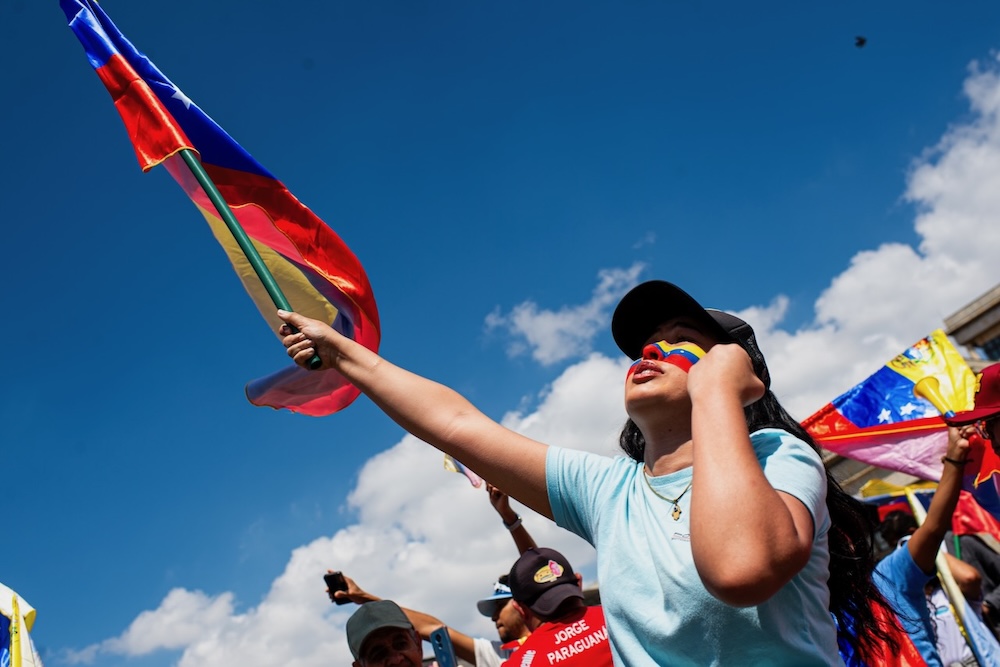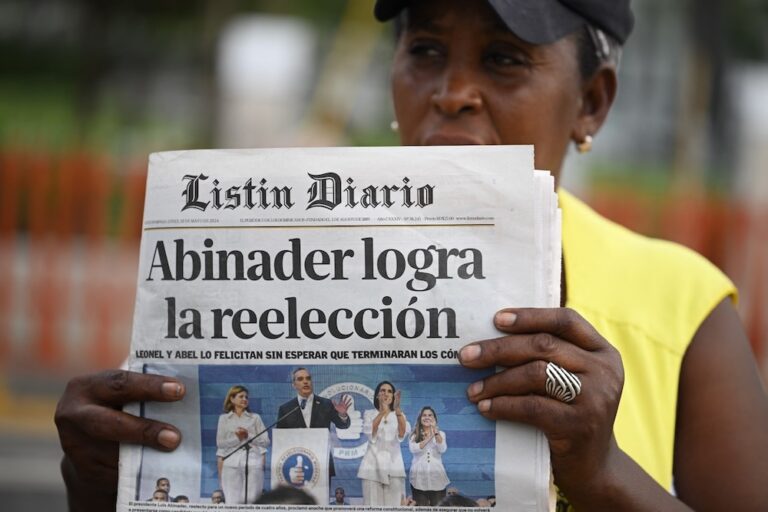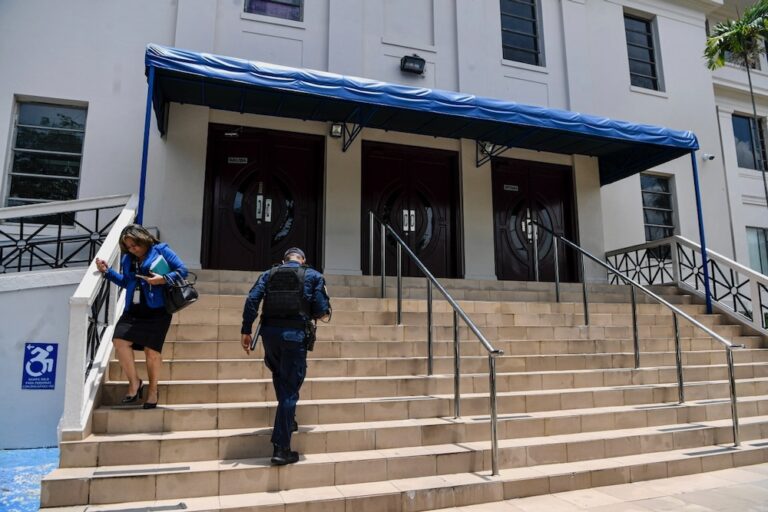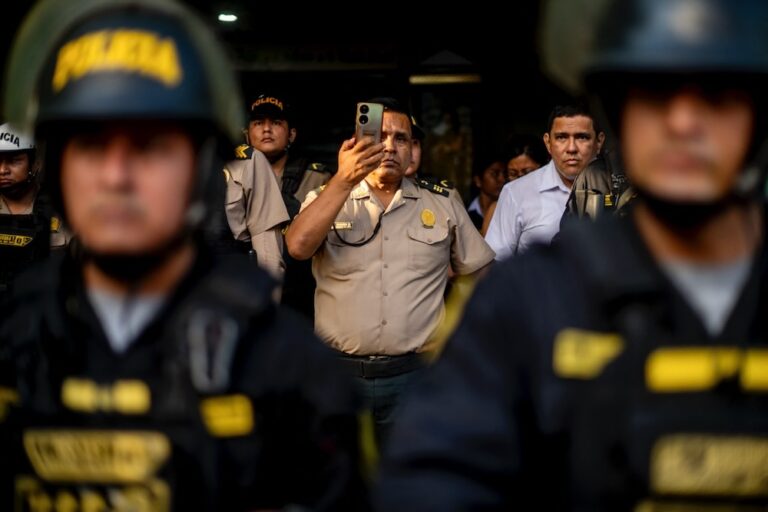January in the Americas: A free expression and civic space round-up produced by IFEX's Regional Editor Laura Vidal, based on IFEX member reports and news from the region.
January brought a harsh reminder of the ongoing violence against the press with the assassinations of journalists in Mexico, Colombia, and Peru. In Venezuela, the government intensified its crackdown on civic space, with the forced disappearance of IFEX member Espacio Público’s director Carlos Correa and increased attacks against journalists and civil society organisations. Meanwhile, in Guatemala, a Supreme Court ruling allowing José Rubén Zamora to await trial under house arrest offers a rare moment of hope for press freedom. Through it all, civil society organisations are working together, harder than ever, to defend freedom of expression and freedom of the press rights despite an increasingly hostile environment.
A deadly start to the new year
Before the end of January, four journalists had been murdered across the region: Gastón Medina in Peru, Óscar Gómez Agudelo in Colombia, and Calletano de Jesús Guerrero and Alejandro Gallegos León in Mexico. This was a brutal reminder not only of the vulnerabilities journalists investigating corruption, crime, and political misconduct face, but also the inability of authorities – combined with an apparent lack of political will – to protect press workers against mounting violence.
On 20 January, journalist Gastón Medina, director of Cadena Sur TV, was gunned down outside his home. Security footage captured an assailant firing at least eight shots before escaping on a motorcycle. Medina was a known critic of local and regional authorities and had exposed irregularities within the judicial system, as well as cases of extortion.
His murder followed a long series of threats and attacks. In 2022, IFEX member Institute of Press and Society (IPYS) reported that Medina had received a funeral floral arrangement, his TV channel was vandalised, and a stick of dynamite and a dead dog were left at his office. Despite clear risks to his life, authorities failed to offer him adequate protection. IPYS, together with other members of the IFEX network, Reporters Without Borders (RSF) and the Committee to Protect Journalists (CPJ), have condemned Medina’s killing and are demanding a thorough investigation. Violence against the press is escalating in Peru, with multiple attacks against journalists through legal harassment, threats and disinformation pushed by the members of the army and the government, and attacks perpetrated by protesters and far-right activists.
On 24 January, Óscar Gómez Agudelo was shot dead in Colombia’s Quindío department. The unidentified gunman fled the scene. Gómez Agudelo was widely known for his hard-hitting investigative journalism, particularly through his program La comunidad por la comunidad, where he exposed corruption and abuses of power. IFEX member the Fundación para la Libertad de Prensa (FLIP) describes Agudelo’s murder as part of a disturbing trend. The growing influence of armed groups and their territorial disputes have silenced entire regions for years and have exacerbated dangers to the media. Since October 2022, at least seven journalists have been killed in Colombia. Already in early 2025, FLIP has documented five more threats against other journalists – an increase from the same period in 2024.
Meanwhile, in Mexico, long regarded as one of the most dangerous countries for journalists, two reporters were murdered in January. Calletano de Jesús Guerrero had been under federal protection for over ten years due to persistent threats linked to his work. Guerrero, deputy editor of Global Mexico, regularly covered crime, violence, and politics in Mexico state.
On 13 January, unidentified men threatened him outside his home. Five days later, he was killed.
The second journalist killed in Mexico, Alejandro Gallegos León, was found dead with gunshot wounds by the side of a road in Tabasco. He covered education and local politics for Tabasco Hoy and ran the independent platform La Voz del Pueblo. Despite the nature of his work, authorities quickly ruled out journalism as a motive for his murder, a pattern that human rights groups and advocators for freedom of expression have long criticised. IFEX member ARTICLE 19 Mexico and Central America also condemned this swift dismissal, warning that prematurely ruling out a journalist’s work as a motive compromises the integrity of the investigation. Leopoldo Maldonado, regional director of ARTICLE 19, said:
“It has become a pattern among prosecutors: as soon as a journalist is murdered, they immediately discard journalism as a motive. This is unacceptable under human rights standards. In countries like Mexico, where press-related violence is systemic, the first hypothesis should always be the journalist’s work. Yet, authorities rush [to leave this out] to minimise the political costs of these crimes.”
“No one guarantees my safety”, a 2024 joint report by CPJ and Amnesty International, highlighted the persistent failures of Mexico’s state protection mechanisms in safeguarding journalists, citing a lack of resources, inadequate risk assessments, and poor enforcement. RSF has documented similar shortcomings in other countries within the region, emphasising how political interference and weak institutional support render these mechanisms ineffective.
These reports also document a disproportionate impact on women journalists. Most state protection mechanisms lack a gender-sensitive approach, downplay the risks, and neglect the mental health challenges tied to their profession and family responsibilities. In the CPJ and Amnesty International report, many women journalists expressed that officials disregard their dual role as both journalists and primary caregivers, often as single mothers, which can make them more vulnerable.
“They’re very cruel to women, many of whom are displaced and have young children, and they treat them very badly,” said one journalist about Mexico’s state mechanisms’ staff. Another noted: “They don’t consider whether or not you have a disability, or what it is.”
Venezuela: new and more violent attempts to close civic space
January in Venezuela saw heightened tensions as opposition leader Edmundo González Urrutia vowed to return and assume power following the contested presidential elections of 2024. However, some concerns dissipated as it became clear that the opposition had no immediate plans for action. As a result, Nicolás Maduro’s inauguration took place, attended by key regional allies and accompanied by renewed promises to crack down on dissent while preparing for an “armed struggle” against “international conspiracies”.
Among the most alarming developments was intensified repression of the press and civil society, with over 75 people arrested according to Foro Penal.
Close to the date of Maduro’s inauguration, on 7 January, Carlos Correa, director of IFEX member Espacio Público, was forcibly disappeared for nine days. Authorities denied his detention and barred him from contact with family or legal representation. Upon his release, Correa was placed under precautionary measures, including periodic court appearances, a tactic frequently used against political prisoners in Venezuela.
Together with many local and international organisations, IFEX issued a statement stressing that this forced disappearance occurred in a context of intensified harassment and systematic persecution against civil society actors and organisations representing critical voices in defense of civil and political liberties. IFEX also underscored that these patterns of repression have been documented by international bodies such as the United Nations’ Independent International Fact-Finding Mission on Venezuela.
Even prior to Maduro’s inauguration, on 9 January, authorities detained Leandro Palmar, news director at Luz Radio, and his assistant Belises Salvador Cubillán, while they were covering anti-government protests in Maracaibo. They were charged with terrorism, conspiracy, inciting hatred, and disturbing public order – allegations frequently weaponised against independent media. A criminal court ordered their continued detention on 11 January.
The National Press Workers Union reported that both journalists were denied access to private legal counsel and assigned a public defender.
“Venezuelan authorities are clearly seeking to prevent citizens from being informed about the government’s abuses of power with the arrest and charging of journalists covering anti-government protests,” said CPJ’s Latin America program coordinator, Cristina Zahar. As of 22 January, IFEX member IPYS Venezuela reports that 10 journalists remain imprisoned in Venezuela. Of these, three were detained in January 2025, six throughout 2024, and one since 2022.
In brief
- With El Salvador’s Universal Periodic Review (UPR) in process, the international community has called on the Salvadoran government to respect freedom of expression and suspend the ongoing state of exception, citing concerns over prolonged restrictions on civil liberties.
- IFEX members signed on to a statement welcoming Guatemala’s Supreme Court decision to grant journalist José Rubén Zamora Marroquín a favourable appeal. The decision allows Zamora to defend himself from his home against politically motivated charges that had kept him behind bars.
- Judicial harassment of journalists in Brazil: The Judicial Harassment Monitor Against Journalists, launched by IFEX member Abraji in May 2024, has recorded 654 lawsuits targeting journalists, spanning 84 cases from 2008 to 2024. Among them is journalist Amanda Miranda, who has faced three lawsuits related to her investigative reporting.
- El País published an audiovisual investigation by FLIP and ARTICLE 19, exposing the use of surveillance technologies as tools of censorship and political control in Mexico, Colombia, and El Salvador. The project features testimonies from journalists Carmen Aristegui, Claudia Julieta Duque, and Carlos Martínez, who recount the distress and rights violations they endured due to government surveillance. Experts highlight the human rights implications of these monitoring tactics.



